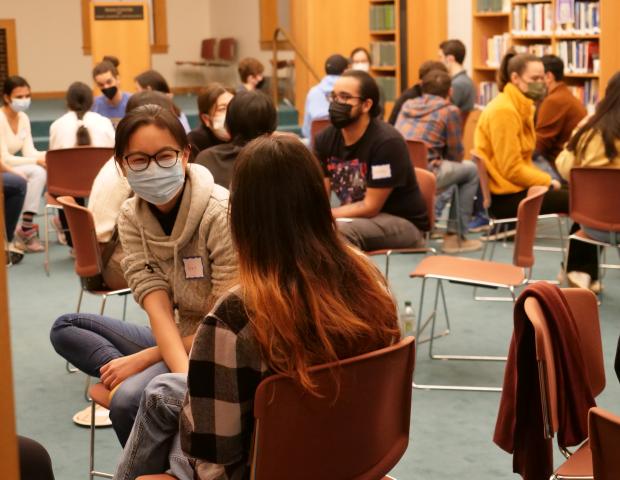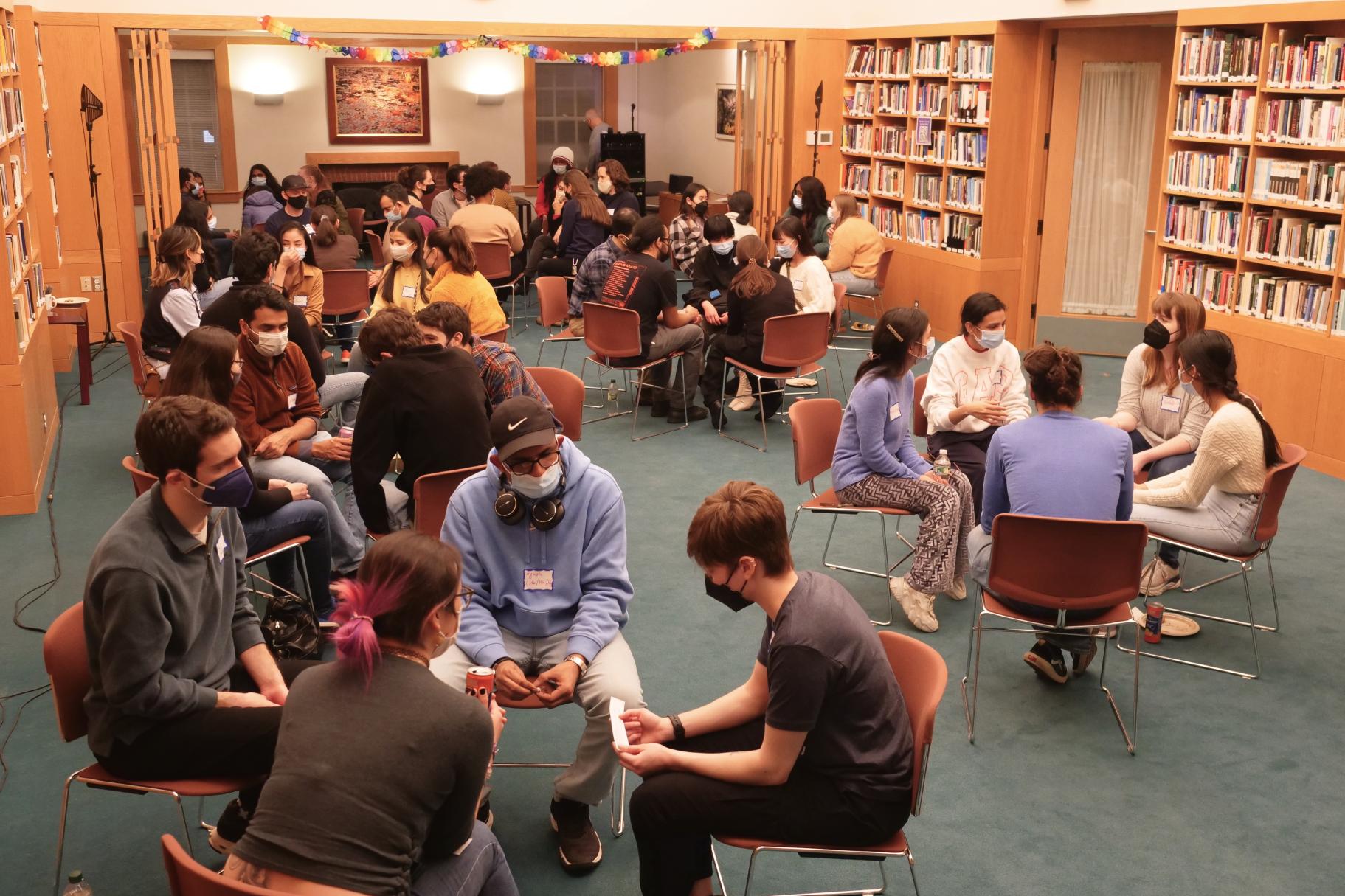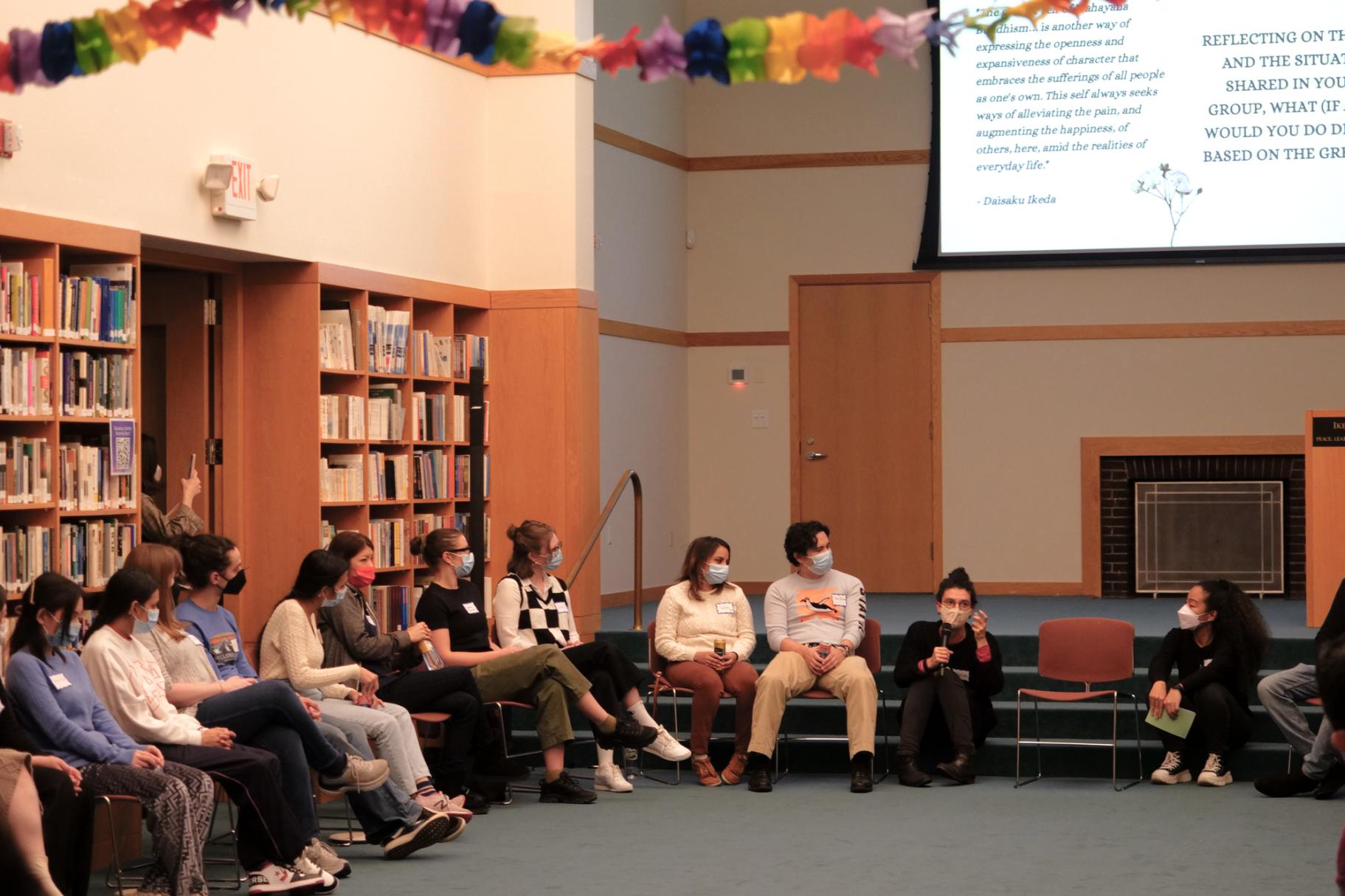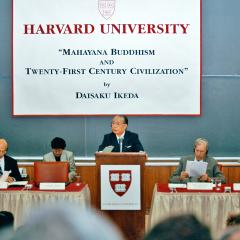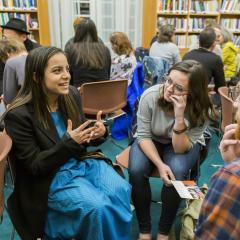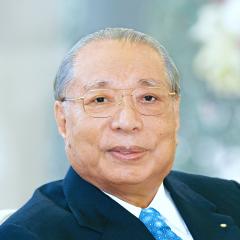Dialogue Nights #24: Bringing Forth Our Greater Self
Full group reflection during Dialogue Nights
It was fitting that the first public event of the Ikeda Center’s 30th anniversary year was a Dialogue Nights gathering. After all, there is no activity or ethos more central to Center founder Daisaku Ikeda’s life and body work than dialogue, in all its forms.
Indeed, as first-time Dialogue Nights moderator Preandra Noel shared in her welcoming remarks: “It was in the chaos of post-war Japan that [Mr. Ikeda] encountered Buddhism and developed a lifelong passion for and commitment to dialogue … as a means for rooting out the fundamental causes of human conflict.
More than 50 enthusiastic Boston-area university students and young professionals attended the February 17 event, called “Bringing Forth Our Greater Self: How Do We Do It?,” which had been re-scheduled because of the extreme wind chills earlier in the month. After the viewing of a “person-on-the-street” video featuring reflections on the greater self from people in Harvard Square, Preandra, who is the Center’s Program and Office Assistant, provided some background on how the topic was chosen. In 1993 Daisaku Ikeda delivered his second Harvard lecture, “Mahayana Buddhism and Twenty-first Century Civilization.” Inspired by the reception to his talk as well as Cambridge’s vibrant higher education environment, he founded the Center as “a tangible commitment to the spirit behind the talk, in which he highlights the various contributions that Mahayana Buddhism can make to the peaceful evolution of humanity.” Given the centrality of the lecture to the Center’s work, the Dialogue Nights planning team (which includes the Ikeda Center Youth Steering Committee) decided to devote each Dialogue Nights in 2023 to a core theme from the lecture.
Introducing the evening, Preandra noted that a key purpose of Dialogue Nights is to actualize the “infinite potential of youth” to be “agents of change in our local communities.” Given that, it made sense to begin the year with an exploration of the greater self, especially because this conviction is central to the lecture. “I am firmly convinced” stated Ikeda, “that a wide-scale awakening to this greater self will give rise to a world of creative and symbiotic coexistence in the coming century.” With that conviction as foundation, Preandra said that “throughout our program we will explore your thoughts and experiences “on three questions: What is the greater self? How do we bring it forth? And what are its implications for transforming our lives and society?” She then turned the mic over to the Center’s Outreach Manager, Anri Tanabe, for the first activity.
Two Dialogues: Sharing Insights on the Lesser and Greater Selves
As an icebreaker, Anri led participants in an opening dialogue inspired by the words of Ann Diller when she spoke at the 2011 Ikeda Forum. Diller observed: “The voice of the greater self … is compassionate and inspires us to do better when we have fallen short of our ideals. The voice of the superego [understood as the lesser self], on the other hand, is “condemning” and “mean-spirited” and encourages us to doubt ourselves.” Anri explained that the opening dialogue would utilize Diller’s concept, focusing on ways to distinguish the negative self-talk of the lesser self from the positive self-talk of the greater, in other words, “how to change the narrative.” To do this, each small group would first receive a statement illustrating the voice of the lesser self – for example, “I can’t believe my friend texted me to cancel at the last minute. They always do this. I’m never inviting them again.” For the discussion, the groups were invited to speculate on what their greater self might say instead. During a quick share-back, several participants offered examples from their groups. To the lesser self who thinks others would somehow like them more if they dressed better, the alternative was simple: My greater self wouldn’t care what others think, and “if I want to wear this shirt I’m going to wear this shirt!” Of those our lesser self judges as unfriendly, the greater self might instead show some compassion and wonder if it’s “maybe because they are going through something in their life.” In response to the same scenario, another suggested that “maybe I should try to know them better so that way we can form a connection.”
After a couple more share-backs, Preandra thanked Anri and mentioned that the activity reminded her of something that the author of The Happiness Project, Gretchen Rubin, once said, which is that “it is easy to be heavy; hard to be light.” The voice of the lesser self surely is both easy and heavy, suggested Preandra, but the lightness of our “greater self voice” is always within reach if we choose it. She then introduced the guiding questions for the next small group dialogue: What are some characteristics of your lesser self? Under what situations does your lesser self come out? Share a recent experience where you may have been operating from your lesser self. After a 20-minute discussion on this topic, Preandra welcomed everyone back for an in-depth whole-group dialogue. The small group dialogue provided the “opportunity to get to know our lesser self,” said Preandra, “and we’d now like to talk about how we can get to know our greater self more deeply.” To aid that investigation, Preandra shared this key quote from Mr. Ikeda’s lecture:
The greater self of Mahayana Buddhism … is another way of expressing the openness and expansiveness of character that embraces the sufferings of all people as one’s own. This self always seeks ways of alleviating the pain, and augmenting the happiness, of others, here, amid the realities of everyday life.
What followed was an insightful, free-flowing discussion among the whole group. The opening thoughts from participants focused on the value and challenge of learning to be open, in a healthy way, to diverse perspectives — that is, not simply shutting down in the face of conflict but practicing ways of staying in relation with others so that some level of understanding can be achieved. For example, said one speaker, we act from the greater self when we learn to look at the why of what someone is saying or doing rather than the what of what they are saying or doing. To illustrate, Preandra said that she uses this technique when she is frustrated with something her dad says, understanding he is motivated by love for her.
Another added that we do well to bring enough trust to our interactions with others to be able “to articulate what’s really going on” with you, so that fresh solutions might appear. This does require courage, too, they added. Along these lines, another suggested that since the lesser self often comes out when one is in emotional or physical pain, maybe we need to develop a “greater self muscle” to maintain connection with others during these stressful times. Finally, speakers during the initial discussion offered simple habits of the greater self, such as going easier on yourself and taking pride in small victories. In other words, being the kind of friend to yourself as you would be with others.
After these opening ideas, the remainder of the discussion turned to a consideration of one participant’s constructively provocative contention that the essence of the guiding quote from Mr. Ikeda was simply “too idealistic for me.” Is it realistic to “always alleviate the pain of others?” What about self-care? What about me? How do I do both? With this, the speaker put their finger on one of the most subtle aspects of how Ikeda understands the greater self. And during the following discussion, as participants offered diverse, astute perspectives on this perennial question, they actually intuited many of the nuances found in Mr. Ikeda’s other writings on the greater self, beyond the Harvard lecture and the quote shared to guide the discussion. In their own words the participants illuminated dimensions of Ikeda’s Buddhist teachings on topics such as the meaning and importance of self-culture, the necessary relationship between the lesser and greater self, the unity of self and environment, and what the scholar Jim Garrison has called “social self-actualization.”
The first to follow up was a teacher who talked about the need to balance “selfishness and selflessness” when preparing for class, since to have anything of worth to “give to the kids,” she herself first needs to feel fulfilled. Others chimed in noting that martyring yourself does no good for others that you might be able to help or be a positive example for, and, further, that no one should try to carry the weight of the world on their shoulders. In an interesting twist, another person pointed out that if practicing compassion for ourselves enables compassion for others, it could also be said that practicing compassion for others might facilitate compassion for ourselves, especially in how it helps release us from the burden of judging others, and in turn ourselves. Rich, related discussion addressed the matter of the lesser self and whether it is something that is wholly negative, needing elimination. Don’t we need, asked one speaker, the aggression of the lesser self sometimes, perhaps for self-protection or preservation? Picking up on this point, another pointed out that sometimes your own willingness to be selfish is what you should “demonstrate” for those others who might be susceptible to martyrdom.
A compelling perspective was added to the dialogue when one participant suggested that the best way to look at the relationship between the greater and lesser self is to say that the greater “encompasses” the lesser. This gets around the unhelpful tendency among humans to want to negate or deny that which is potentially problematic. And it is perfectly in line with the observation of another participant who explained that for Nichiren Buddhists like herself and Mr. Ikeda, the focus is primarily on “understanding who you are in full.” Finally, a participant made the intriguing observation that the best way to look at Mr. Ikeda’s quote is to see it as an expression of or advocacy for “solidarity.” If our lesser self manifests as the isolated self, the greater self manifests most fully in community, where we have the opportunity to help one another.
Conclusion: The Greater Self and the Power of Youth
With the group discussion concluded, Preandra turned the floor over to Center Program Manager Lillian I for a concluding activity. After thanking Preandra for her stellar moderation, Lillian complimented the participants on all the “mic drop moments” that occurred during the discussion and thanked them all for helping her get in touch with her own greater self “for the first time this week.” Then, to focus the concluding discussion, Lillian returned to the quote shared during Preandra’s introduction that had contributed so much to the planning of the dialogue. “A wide-scale awakening to this greater self,” said Ikeda, “will give rise to a world of creative and symbiotic coexistence in the coming century.” This conviction, said Lillian, inspired the question “we want to leave you with today”: What do you think our world would look like if more and more people, starting with each one of us here, could tap into and bring forth our greater self? With that, she invited everyone to find their partner from the icebreaker to reflect together on this question. She also invited everyone to share their responses on the Padlet board app. With just a few minutes left, some of the participants shared their visions. One proposed showing “more compassion for each other” at the day-to-day level, adding that if we take a “more selfless view toward others” we might find ways to “solve” our challenges together. Another tried to balance “cynicism and hopelessness,” saying the best path is “not making the world worse and living in harmony.”
Acknowledging the hopelessness that so many do feel today, Lillian suggested that this is precisely the time to attempt to bring forth the greater self. Then, recalling the earlier comments about the relationship between greater self and human solidarity, she introduced a concluding thought from a youth appeal jointly written by Mr. Ikeda and Nobel Peace Prize Laureate Adolfo Pérez Esquivel. In it, said Lillian, they “reminded me of why we have these Dialogue Nights and why it’s so important for youth to come together and believe in themselves.”
We direct our call to the young people of the world. There is no challenge that cannot be resolved if we unite in solidarity. We are confident that young people will take up the search for solutions, acting in solidarity from within their respective places of belonging across all differences of spiritual and cultural identity to generate waves of dynamic, shared action. We call on youth to take on the responsibility of walking together with the people, embracing the confidence that each of their actions will produce results in future.
